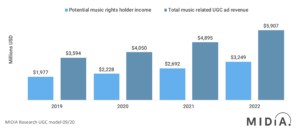Frequently Asked Questions regarding Audible Magic’s Acquisition of MediaNet’s Business
On Monday, January 11th, 2021, Audible Magic and SOCAN announced that the companies had entered into an agreement to transfer SOCAN’s content fulfillment and rights administration business to Audible Magic.
Understandably, many content partners and customers of both MediaNet and Audible Magic have questions about what this means to their day-to-day interactions and services they may have been receiving from each company. We hope that the information below will provide some guidance, but always, feel free to reach out to us for further information. Both teams remain fully committed to our content partners and customers.
When does this acquisition go into effect?
The acquisition will be effective as of January 6, 2021.
Why is Audible Magic making this acquisition?
This acquisition enables Audible Magic to offer a unique one-stop-shop solution for digital service providers and UGC hosting platforms looking to manage copyrighted content. Audible Magic will be able to offer licensing, rights management, and royalty administration as well as industry-leading content identification services.
What are the benefits to Audible Magic customers?
Current Audible Magic customers will now have access to a full suite of content management services including licensing, rights management, royalty administration, and media fulfillment.
What are the benefits to MediaNet customers?
MediaNet customers will gain access to the gold standard in content identification services so important for accurate attribution of copyright, licensing, rights administration, and reporting.
Will there be any changes to the services provided to MediaNet or Audible Magic customers?
Both Audible Magic and the MediaNet teams remain committed to all existing customers with the same level of support.
Are there changes to my contacts at MediaNet or Audible Magic for business or technical issues?
We do not intend to change your primary business contacts currently. If you do have any questions, please contact us at [email protected]
Will there be changes in how content partners should deliver content feeds?
There will be no immediate changes in how a content partner sends feeds to either Audible Magic or MediaNet. However, we will be looking into options to make the process easier for our content partners moving forward.
Will there be any changes to the processing of royalty payments or accounting reports?
The processes currently in place will continue as before the acquisition. As the two companies merge, we will be looking for opportunities to provide improved processes to benefit our content partners and customers. If you have any questions, please contact us at [email protected].
Are there changes planned to MediaNet customer billing and invoicing for services?
Yes, invoices will be issued with an Audible Magic logo starting in January. You will have access to your invoices and statements via an online portal. You will receive a link via email to set up your account within the portal, as well as a user guide for questions and assistance. Remittances should be made per the instructions on the invoice.
Audible Magic Acquires MediaNet’s Business from SOCAN, Integrating UGC & Premium Music Solutions
Audible Magic to offer “one-stop-shop” for music licensing and copyright compliance
Los Gatos, Calif. – Jan. 11, 2021 – Audible Magic and SOCAN announced the companies have entered into an agreement to transfer SOCAN’s content fulfillment and rights administration business of MediaNet to Audible Magic. Audible Magic is the leading provider of identification and compliance solutions to social networks hosting user-generated content (UGC). SOCAN is the Canadian performing rights organization. MediaNet has a long history of delivering turnkey white label digital music solutions for Internet radio, subscription music services, on-demand streaming, and support for fitness and gaming applications. With this acquisition, Audible Magic can now provide digital platforms a comprehensive range of services to enable and manage the use of music.
Audible Magic provides solutions for music licensing, content identification, and rights management to social media platforms. This acquisition extends its capabilities to deliver bespoke licensing from hundreds of labels and publishers, media files for more than 92 million tracks, full rights management, and royalty and payment administration. This portfolio of services will enable social platforms to more easily exploit the opportunity for both music in UGC and premium content. According to a recent MIDiA Research report, The Rising Power of UGC, there is a projected $6 billion opportunity in the appropriate use of audio and video for streaming of music in UGC alone.
“Rightsholders and platforms will both benefit from our combined solution and will reduce the time and complexity of managing and paying for the use of music,” said Vance Ikezoye, Audible Magic chief executive officer. “We see significant upside in enabling incremental revenues for the music ecosystem.”
SOCAN and Audible Magic also announced they have entered into a strategic partnership with the goal to use Audible Magic technology and services to help SOCAN improve operational accuracy and reporting to publishers and songwriters.
“The acquisition of the MediaNet services by Audible Magic creates long-term benefits for SOCAN’s members and clients,” said Jennifer Brown, Interim CEO of SOCAN. “Audible Magic is a knowledgeable and skilled company and we’re looking forward to working together to improve the accuracy of reporting to publishers and songwriters.”
SOCAN acquired Seattle-based MediaNet in 2016. By legal agreement, terms of Audible Magic's acquisition are confidential.
About Audible Magic
For more than 20 years, Audible Magic has innovated solutions to identify content, manage rights, and monetize media. Audible Magic’s Emmy-winning automatic content recognition (ACR) technology powers billions of monthly transactions. The Silicon Valley pioneer is the trusted intermediary between major platforms and rightsholders (including labels, studios, distributors, publishers, and collectives). The company works with a wide range of platforms and rights holders, including Facebook, Twitch, SoundCloud, Dailymotion, ShareChat, Vimeo, NBC Universal, Universal Music Group, Sony Music Group, Warner Music Group, The Orchard, CDBaby, and Distrokid. For more information, visit https://www.audiblemagic.com/.
About SOCAN
SOCAN is a rights management organization that connects more than four-million music creators worldwide and more than a quarter-million businesses and individuals in Canada. More than 160,000 songwriters, composers, music publishers, and visual artists are its direct members, and more than 100,000 organizations are Licensed To Play music across Canada. With a concerted use of progressive technology and unique data as well as a commitment to lead the global transformation of rights management, SOCAN is dedicated to upholding the fundamental truths that music and visual arts have value and creators and publishers deserve fair compensation for their work. For more information: www.socan.com.
Contact:
Adriana Saldaña
Sterling Communications for Audible Magic
+1 408-395-5500
Innovative Music Licensing Frameworks Will Be Key To UGC-Powered Music Expansion - Forbes
“Traditionally many people look at UGC as a promotional tool used to generate demand for music, says Audible Magic founder and CEO Vance Ikezoye, who has more than 20 years of professional experience in the music industry. “But it’s really a new form of content with big potential for platforms and content owners…people go to TikTok, not for the music, but for the creativity and creation opportunity.”
Read the full article by Forbes here.
ShareChat Partners with Audible Magic to Manage Licensed and Unlicensed Use of Music - Yahoo News
Sharechat, India’s largest Indian social media platform, announced it has partnered with Audible Magic, the leading provider of rights management and automatic content recognition (ACR) solutions. ShareChat chose Audible Magic for its comprehensive reference registry containing over 40 million registered works representing global and local music from across the world. Audible Magic is considered the gold standard for content identification and will enable ShareChat to proactively address both licensed and misuses of copyright media.
Read the full article by Yahoo News here.
Audible Magic Sponsors MIDiA Research Report on The Rising Power of User-Generated Content
UGC is the next music industry growth driver and the short-term opportunity is worth $6 billion
London and Los Gatos, Calif. – Oct. 26, 2020 – User-generated content will contribute a significant proportion of the growth in music consumption over the next two years in an opportunity that is worth circa $6 billion to the music industry value chain. Rights holders could see $3.2 billion of this in the next two years, as a new report by MIDiA Research in partnership with Audible Magic, has found—with UGC already having contributed over one billion dollars to global music revenues in 2019.
‘The Rising Power of UGC’ report, which is available to download for free here, examines the dramatic and continuing growth of UGC creation and consumption and highlights that this ongoing expansion requires the implementation of new, simpler licensing frameworks, especially for music.
This report also considers some of the implications of the 2019 EU Copyright Directive, which acknowledges the importance of UGC in today’s economy and presents unique opportunities to encourage the growth of the digital streaming market.
The rising power of UGC is reflected by the sharp growth in social media platforms in 2020, totalling 7.7 billion gross users. Lil Nas X’s Old Town Road, as one example, set a new course for music industry marketers by becoming the first clear example of the ‘song as a hashtag’ – turning a song from a TikTok meme into a global smash hit. More than two billion streams later, almost every marketer in the industry is hoping to repeat the song’s success – though not necessarily with a clear blueprint as to how to do that.
Social media and UGC platforms do not respond to traditional licensing structures and as a result, opportunities are being missed. Framing these trends within the poor performance of ad-funded models, the slowing down of subscription revenues and the absence so far of alternative ways to monetise fandom, the report advocates new ways for the industry to approach UGC to become a win-win for technology platforms and content providers. Social media platform advertising revenue, meanwhile, totalled $119 billion in 2019 – a huge addressable market, while in-app purchases and virtual merch are emerging forms of monetisation.
Content owners might well ask “what’s next?” But what’s next is already here: social media is the new music consumption; it just isn’t being fully monetised or utilised.
Commenting on the implications of these shifts for content companies, a major label executive said: “It is important for music content owners to start imagining UGC as another format or channel for the delivery of music rather than simply as promotion or audience development.”
Mark Mulligan, MIDiA Research’s managing director said: “As music subscriptions edge towards maturity in many Western markets, the music industry needs new growth drivers. UGC has long been under-monetised for music rights holders but its potential now is bigger than ever.
“We are entering into an era where we are all becoming creators, whether that be editing digital photos, making a lip sync video or even creating a mashup. We are leaning forward and interacting with our content more and more, with more tools at our disposal. Music continues to be the soundtrack to both our lives and to UGC content. We sit on the cusp of the next chapter in music consumption and monetisation.”
About Audible Magic
For more than 20 years, Audible Magic has innovated solutions to identify content, manage rights, and monetize media. Audible Magic’s Emmy-winning automatic content recognition (ACR) technology powers billions of transactions monthly. The Silicon Valley pioneer is the trusted intermediary among rightsholders (including labels, studios, distributors, publishers, and collectives) and major platforms. For more details visit our website: www.audiblemagic.com
About MIDiA Research
MIDiA Research is a market intelligence and consulting firm with longstanding expertise in the business of entertainment and digital media. We help businesses formulate commercially actionable strategy to navigate the evolving digital landscape. Our clients leverage our expertise, proprietary multi-country consumer data and market forecasts to enable smarter and faster decisions. We work with record labels, TV networks, streaming services, tech firms, financial organisations, gaming and sports companies, providing unparalleled insights into trends and innovations shaping the entertainment market and audience behaviours. For more details visit our website: www.midiaresearch.com
Contacts
Julia Hutchinson
Audible Magic
Dara Jegede
MIDiA Research
7 Hard but Very Telling Questions for Your Automatic Content Recognition Vendor (ACR)
Consider These Issues to Avoid Costly Mistakes
Whether you are focusing on copyright compliance or licensing content for UGC, the choice of an automatic content recognition vendor may seem ancillary to your platform; the reality is that it is a crucial decision for your business. Choosing the wrong vendor can be costly and limit your ability to grow, significantly degrade your user experience, expose your service to large volumes of takedown notices, or worse.
Finding the right ACR vendor that will help you meet your compliance and licensing needs involves quite a bit of research. You may have spoken with colleagues, combed through several vendor’s websites, and possibly met with the sales representatives. Before you sign on the dotted line, there are a few key and often over-looked questions that will drive your decision.
1. Does the ACR vendor have a customer list? Are they the vendor of choice for the top platforms in the world?
Audible Magic’s customer list is a who’s who of the UGC sites both in social media and music distribution, including such services as Facebook, Instagram, Twitch, Vimeo, CD Baby, SoundCloud, The Orchard and Dailymotion, and many, many others.
Rightsholders recognize this and work with us to manage the appropriate use of their content. The list of rightsholders who proactively register with Audible Magic consists of over 140,000 music labels and over 1000 video suppliers across the globe. Our registry includes content from industry leaders such as Universal Music Group, Sony Music Entertainment, Sony Pictures, CBS/Showtime, Disney, NBC Universal, Warner Music Group, FOX, RTL Group, Grupo, and Canal+.
2. How does your vendor mainly acquire their customers?
Audible Magic is proud and humbled that we have built a business on unsolicited references from rightsholders and platforms. We continue to earn this praise through continued technical innovation and proven performance over many years.
3. Are you interested in a transactional relationship, or are you looking for a trusted advisor that is experienced and understands the latest regulatory changes?
At Audible Magic, we bring 20 years of experience with all types of business models. We have long-term relationships with key players in the industry and understand the challenges of compliance and licensing. We have top players on our team from the industry with extensive knowledge of rights management as well as an understanding of automatic content identification. With each identification, we understand that we are helping you make decisions that will impact your business.
Although you may think you are only buying a transactional service with Audible Magic, you are gaining access to a team with in-depth industry knowledge that can guide you through issues such as the recent changes in the EU Copyright Directive (aka, Article 17).
4. Will you have access to a support team or a bot?
Audible Magic has an experienced team of customer support analysts here to support you via phone or email 24/7 if needed.
5. Do you want a vendor that has been working to build a trusted bridge between platforms and rightsholders, or do you want a vendor that has been servicing only rightsholders?
Audible Magic has been building a trusted bridge between the rightsholders and the platforms by providing services that bring clarity to the use of audio and video. Other vendors come from a very combative history in the industry. As a platform, what kind of vendor do you want to hire? At Audible Magic, you are our customer, and because of our position in the industry, we provide a balanced bridge between rightsholders and UGC services.
6. Does the solution sound too general-purpose or feel too slick? It probably is.
We deal with many types of platforms with different business models and have found that a one-size-fits-all solution, well, doesn’t get the job done. We work with our customers to provide the best result for their specific needs, resulting in extremely high accuracy rates and at extremely high volumes (hundreds of millions of transactions per day).
The ability to provide highly accurate identifications allows your business to grow without human intervention, constantly reviewing misidentified files. You’ll want a service that minimizes the impact on user experience. Imagine telling a user that the file he just uploaded includes unauthorized copyrighted material, and it actually doesn’t. That happens with solutions with other vendors and is extremely rare with Audible Magic’s technology.
When it comes to licensing, some customers need to administer directly licensed deals, while others need sub-licenses. Your ACR vendor should be flexible enough to meet your needs for compliance, licensing, and reporting.
7. New is not necessarily better. Do you want to entrust the future of your business to unproven technology or business acumen?
Audible Magic has assembled an innovative and experienced team that has kept pace with the latest developments in the industry, whether it is short clip length or creating a solution to identify covers. Our ever-growing list of patents (51 and counting) shows we mean business when it comes to innovation. Twenty years doesn’t mean staid. It means we have successfully, over the last two decades, met the challenges our customers continuously bring us.
Audible Magic Monetizes Music On User Generated Content
Automatic content recognition (ACR) solutions provider Audible Magic has launched its UGC Music Rights Platform (UMRP), which simplifies the licensing and administration of music rights for user-generated content on social media.
Read more here.
AM's CEO Vance Ikezoye Talks About Current Practices at the EU Copyright Stakeholder Meeting
December 16, 2019
Introduction
My name is Vance Ikezoye. I am co-founder and CEO of Audible Magic. With me is Mike Edwards, General Manager and Vice President for the EMEA region. We would like to thank the Commission for this opportunity to speak.
For the purposes of this presentation, we would like permission to use the term “Platform” to represent the Online Content-Sharing Service Providers (OCSSP).
Audible Magic is a technology company that was founded in 1999. Over the past decade, we have been one of the leading providers of copyright identification services to these platforms.
Business Roles and Policies
I would like to share an overview of how we work with Platforms and the Content Industry. Our customer, the party that pays for our services, are the Platforms. The Rightsholders have and must take affirmative action to register their repertoire into our systems. We do not charge Rightsholders for works registration.
Usage and match data are confidential information of the Platform. Any release of that information requires explicit approval by the Platforms. However, our current agreements generally allow us to provide limited information to Rightsholders about the services used by each Platform.
Since the Platforms pay, they have discretion as to what services they use and what content they process.
This arrangement has been working well in practice for over a decade. We believe that most of our customers and rightsholders act in good faith and are trying to do the right thing for all involved, including the consumer.
The Technology
Our service uses a fingerprinting technology which we have developed and continue to enhance. A fingerprinting technology matches content based upon perceptual characteristics of the content itself. It doesn’t rely on metadata or embedded marks. The technology can differentiate between live and studio versions of the same song. We provide services for identifying music and film/video content.
Audible Magic’s scientists were among the early pioneers of audio fingerprinting and obtained many of the first patents in the field. We continue to invest and enhance the technology to keep up with the rapid changes in digital media. We have also been granted an extensive portfolio of patents which provides our customers peace of mind from any threat of litigation for patent infringement. Uniquely, we indemnify our customers against any claims for patent infringement arising from the use of our technology.
Works Registration
We have over 140,000 rightsholders’ content registered in our program across music and film/video. We receive on average 300,000 new works per month. This content comes from over 140 countries. We have a range of rightsholders from major record labels and Hollywood studios with millions of works, to independent singer/songwriters with five tracks. There are no restrictions. Any bona fide copyright owner may register their works with Audible Magic. Most of these registrations are provided to us prior to commercial release or broadcast.
The Registration Process is very straightforward. Rightsholders contact AM; many times they are referred to us by our platform customers. They first sign a simple 2-page registration agreement. We do not charge rightsholders for registration of their works.
Rightsholders then either provide digital or physical copies of their works or we provide them tools to fingerprint the content themselves. They provide us basic information about each copyrighted work, including song titles, artist names, record labels, show titles, season and episode numbers. In addition, for each title, they supply us their designated business rule, such as allow, block, or monetize. We can also support duration-based rules, which for example can enable content under a specified duration to be allowed.
We can manage these rules by Platform. Thus, the same work could be blocked at one platform and allowed for use on another. We ingest the fingerprints, metadata, and business rules into our services. This metadata provides the basis for the information communicated to the Platform when a match occurs. This information is then ingested into our identification system.
Many right holders use third party service providers to register their content with Audible Magic and with other service providers. We strongly support moves by organizations such as ALPA to set up a one-stop-shops to enable their members to effortlessly register with multiple content recognition services including Audible Magic, Facebook, YouTube ContentID and INA.
The Identification Service for Platforms
We work with Platforms to implement our service. Platforms deploy a simple piece of software at the point of ingest after upload by the consumer. This integration is very easy, and the programming required is measured in minutes or hours (at most). This software processes the unknown media and generates the data needed to identify the work. This data is sent to our services via the internet. There is no information about the consumer that is used or transmitted to us. Each identification request is processed in less than a second and the service returns the metadata and business rules associated with the matched work back to the Platform.
There are various configurations of the identification technology which are optimized for each platform and their specific use case. We try to balance the thoroughness of the analysis against the cost of the service. In general, the current technology standards that our customers utilize is the unknown content contains 20 contiguous seconds matched to the registered copyrighted content for longer form content, and 5-10 contiguous seconds for short form content.
Every month we process over 3-billion identification requests per month from our customers. At peak, we can process over 8,000 requests per second. These volumes demonstrate the scale of user generated content on social video platforms.
With regards to Staydown capabilities, we have been providing that service since 2008, however most of our Customers have not implemented this feature.
Our customers are diverse. Platforms take the form of websites and mobile applications. Our customers range from some of the largest platforms in the world to small platforms in Africa and Southeast Asia. We have platforms that handle hundreds of files a month and platforms that do thousands per second.
The customers range in technical capabilities. We have small platforms with the CEO acting as the software programmer to major platforms with teams of engineers and lawyers. We have platforms that utilize the ad-support monetization model and those that are subscription-based. As a general rule, most of our platforms do not broadly monetize their UGC videos.
Legitimate Technical Issues
In the course of these Commission Dialogue meetings, there have been a number of issues discussed by the various Stakeholders. Many of these issues are legitimate and worthy of continued discussion. We’d like to briefly comment on some of them:
False Positives and Over-Blocking
The use of an identification technology is the only practical method of dealing with the volume of user content being generated. Since this is an automated process, accuracy is perhaps one of the most important requirements for an identification technology. All technologies are not alike. My co-founder used to say that it is very easy to invent a bad technology. And the reality is that technologies can be optimized for one attribute at the expense of others.
We believe that incorrectly identifying a work, a false positive, is a critical error and therefore ensuring misidentifications are essentially zero is the single most important objective for a production technology. We believe false identifications lead to over-blocking, attributing rights to the wrong content, or platforms having to manually review results.
One example of where false positive problems can occur is with measuring too short a duration of content. Trying to use fingerprinting technology to match one or two seconds of audio is like trying to match two compositions based upon two musical notes.
Copyright Exceptions
Copyright exceptions require a high degree of intellectual judgement and an understanding and appreciation of context. We do not represent that any technology can solve this problem in an automated fashion. Ultimately, these types of determinations must be handled by human judgement. However, identification technologies can supply data which can be used to enable more informed copyright exception analysis.
We fully support the call by many of the organizations representing consumer rights for transparent, accessible, and speedy appeal processes, administered by humans as the optimum way of addressing the issue. We also want to recognize that several of our customers have described in their presentations during these proceedings their redress mechanisms. It is probably because of these redress mechanisms that, in the more than 12 years we have been providing content recognition services to some of the world’s largest platforms, that we have not become aware of any serious or systematic issues in this area.
High Industry Standards
There has been much discussion with respect to the High Industry Standards language of the Directive. We believe that a copyright identification service which meets this bar must have at least the following attributes: First, service must be representative of global content. The service must be accessible and supported by a critical mass of rightholders, who have affirmatively registered their content. And it must be a turnkey and affordable solution for the range of platforms. We believe there are a number of commercially available content recognition services for the music and film/video industries that meet these criteria. Although this is a difficult issue, the drafting of the Directive was very thoughtful with respect to the recognition of the ongoing evolution in media and continuing improvement of technology to identify it.
Complexity of Licensing Administration
The clear intention of the Commission with the Directive is to encourage licensing of content by the Platforms. The reality is that there are complexities related to both the licensing of content as well as the administration of the licenses and royalties. These complexities cause issues of time and expense for both platforms and the rightsholders. The problem logistically is how to manage the sheer number of rightsholders and size of catalogs that exist globally. And an added comment, roughly 90% of the titles registered with us never get identified, even once out of the 3 billion identifications we perform every month, across our platform customers.
Red Herrings
On the other side of these proceedings, there are some issues that continue to be raised as concerns related to the use of identification technologies. These concerns I would characterize as “Red Herrings”.
Cost of the Service
The first Red Herring I would like to mention is the cost of the service. Our service fees are based upon the number of files processed. So smaller platforms with fewer files, pay less than large platforms. We have customers that pay a few hundred Euros per month. In addition, there is an active and competitive market for content identification services, and there is no need for any platform to make the capital investment to develop their own technology. Some of the biggest and smallest platforms in the market are customers of ours.
Cost and Difficulty of Implementation
Another frequently heard Red Herring is the issue that the technical implementation of identification services is time consuming and difficult. We have had customers implement our technology in minutes based only upon our documentation. We also make available technical support to our customers, to help them implement our solutions.
Technology Maturity
We believe that the technology for identification is mature and presents a viable solution to all sizes and types of Platforms. We believe this because our customers prove it. Our services have been used by scores of platforms reliably and non-controversially for over a decade.
Future Directions
With that said, there are areas the tech industry can help both platforms and rightsholders in implementing both the letter and intention of the new Directive. One of the biggest areas, which we cited previously as an issue, is in licensing and royalty administration.
We believe that the content licensing effort for both the platforms and rightsholders is very complex and time consuming. Because platforms are global and rights are by territory, licensing for a platform is a non-trivial exercise.
Secondly, once licenses have been obtained, the effort to administer and report on usage and royalties is very difficult for the platforms. And on the other side, the rightsholders have an equally challenging and difficult time processing and understanding the reports provided by the platforms.
We think this is an area where the technology vendors, such as Audible Magic, can provide further value to supporting the goals of the Commission with Article 17 – which is to enable a more frictionless environment for licensing and use of copyrighted content by consumers and platforms.
I can report that we are collaborating with many music right holders and platforms to develop simple, one-stop licensing processes, and to develop the tools for license management and administration that will remove the need for individual platforms to invest in building these systems themselves. We will be making further announcements in this regard as these systems are launched.
Thank you.
For more information on the fourth meeting of the stakeholder dialogue, you can visit the following page.
Plan Now
It is important to start planning now on how to meet the requirements and understand the impact of the Directive on your business.
Below are some resources to help you understand the Directive and how it may impact your business.
- Take our A17 Assessment Survey for platforms to assess if the Directive affects your company and then assess your readiness to comply
- Learn more about the impact of the EU Copyright Directive on live streaming platforms
- Understand how small social networks will be impacted
- Read the full text of the Directive
- And more is available on our Article 17 page as well as in our blog section
Music Reports and Audible Magic Announce Strategic Partnership
Companies to Expand Licensing and Reporting Solutions for Digital Music
WOODLAND HILLS, CA. and LOS GATOS, CA , California — (April 22, 2010) — Music Reports, the leading independent provider of music rights administration services in the U.S., and Audible Magic, the leading provider of electronic media identification and copyright tracking services in the U.S., today announced the formation of a strategic partnership to expand music publishing, licensing, and reporting solutions for broadcasters, Internet websites, and other digital music users.Read more








